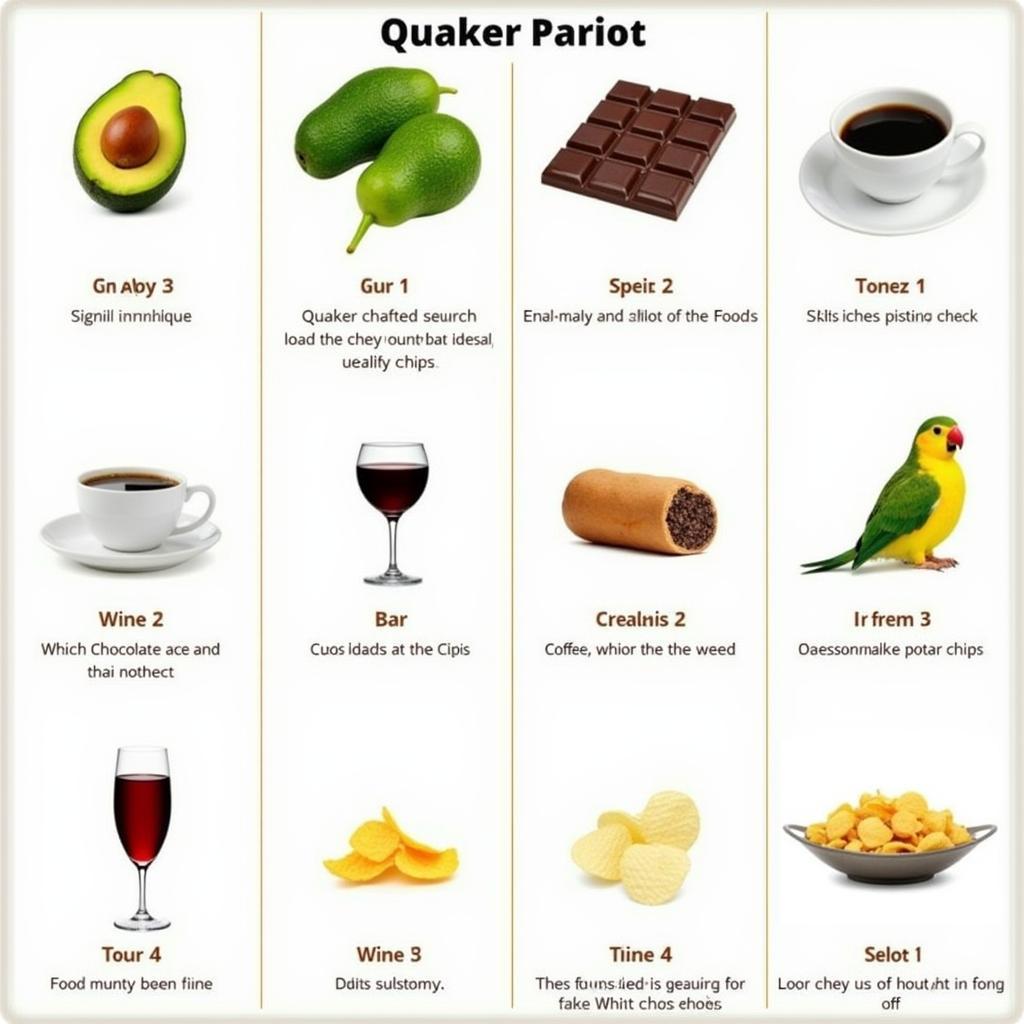Quaker parrots, also known as Monk parakeets, are intelligent and social birds that bring joy to countless homes. As a responsible Quaker parrot owner, providing a nutritious diet is crucial for your feathered friend’s health and longevity. While these playful parrots enjoy a variety of foods, it’s essential to be aware of certain foods that can be toxic or harmful to their well-being. This comprehensive guide will delve into the Quaker Parrot Foods To Avoid, ensuring your beloved companion lives a long, healthy, and happy life.
Common Foods That Can Harm Your Quaker Parrot
Just like humans, certain foods that are safe for us can be dangerous for our avian companions. Here are some common household foods that should never be offered to your Quaker parrot:
-
Avocado: All parts of the avocado plant, including the fruit, pit, and leaves, contain a fungicidal toxin called persin. Persin is highly toxic to birds, potentially causing respiratory distress, heart failure, and even death.
-
Chocolate: This beloved treat contains theobromine, a stimulant that Quaker parrots cannot metabolize effectively. Even small amounts of chocolate can lead to vomiting, diarrhea, hyperactivity, tremors, seizures, and in severe cases, death.
-
Caffeine: Found in coffee, tea, soda, and energy drinks, caffeine is a stimulant that can be detrimental to a Quaker parrot’s nervous system. Ingesting caffeine can cause hyperactivity, restlessness, increased heart rate, tremors, and even cardiac arrest.
-
Alcohol: Alcohol is extremely toxic to birds, even in small amounts. It can cause liver and kidney damage, coordination problems, central nervous system depression, and death. Never offer your Quaker parrot any alcoholic beverages.
-
Salty foods: Quaker parrots have a low tolerance for salt. High-sodium foods like chips, pretzels, and processed foods can lead to dehydration, kidney problems, and other health complications.
-
Sugary foods: While a small treat occasionally won’t hurt, a diet high in sugar can lead to obesity, diabetes, and other health problems in Quaker parrots. Avoid sugary drinks, candy, and processed baked goods.
Toxic Fruits and Vegetables for Quaker Parrots
While many fruits and vegetables are beneficial for Quaker parrots, some can be harmful. It’s crucial to be aware of these and avoid feeding them to your feathered friend:
-
Apple seeds: Apple seeds contain cyanide, a poisonous substance that can be fatal to birds in large quantities. While a few seeds might not cause immediate harm, it’s best to avoid them altogether.
-
Fruit pits and seeds: Similar to apple seeds, the pits and seeds of fruits like cherries, peaches, plums, and apricots also contain cyanide and should be strictly avoided.
-
Mushrooms: Certain types of mushrooms can be toxic to birds, causing digestive upset and other health issues. It’s best to err on the side of caution and avoid feeding mushrooms to your Quaker parrot.
-
Onions and garlic: Onions and garlic contain compounds that can damage a bird’s red blood cells, leading to a condition called hemolytic anemia. This can cause weakness, lethargy, loss of appetite, and even death.
-
Rhubarb: Rhubarb contains oxalic acid, which can interfere with calcium absorption and potentially lead to kidney problems in Quaker parrots.
 A table showcasing various foods that are toxic to Quaker parrots, including avocado, chocolate, caffeine, alcohol, and salty foods.
A table showcasing various foods that are toxic to Quaker parrots, including avocado, chocolate, caffeine, alcohol, and salty foods.
Safe and Healthy Alternatives for Your Quaker Parrot’s Diet
Instead of the harmful foods listed above, opt for these safe and nutritious options to keep your Quaker parrot happy and healthy:
-
Fruits: Apples (without seeds), bananas, berries (strawberries, blueberries, raspberries), melons, oranges, grapes (seedless), kiwi, mango, papaya, pineapple.
-
Vegetables: Broccoli, carrots, celery, green beans, peas, corn, spinach, kale, sweet potatoes, zucchini.
-
Other healthy options: Cooked brown rice, quinoa, cooked beans, lentils, small amounts of cooked lean meat, hard-boiled eggs, low-fat yogurt (unsweetened).
Tips for Introducing New Foods
When introducing new foods to your Quaker parrot, it’s important to do so gradually. Start with small amounts and observe your bird for any signs of adverse reactions, such as digestive upset or changes in behavior.
-
Offer a variety: Provide a diverse range of healthy foods to ensure your Quaker parrot receives all the necessary nutrients.
-
Fresh is best: Choose fresh fruits and vegetables whenever possible. Wash them thoroughly to remove any pesticides or residues.
-
Chop into bite-sized pieces: Cut food into manageable pieces to prevent choking hazards.
-
Monitor your bird’s weight: Regularly weigh your Quaker parrot to ensure they are maintaining a healthy weight.
Conclusion
Providing your Quaker parrot with a safe and nutritious diet is vital for their health and well-being. By being aware of the foods to avoid and offering a variety of healthy alternatives, you can ensure your feathered friend lives a long, happy, and fulfilling life. Remember to consult with your avian veterinarian for personalized dietary recommendations based on your Quaker parrot’s individual needs.
For any concerns or questions about your Quaker parrot’s diet or health, please don’t hesitate to contact us. Our dedicated team at Mina Cones Food is available 24/7 to assist you. You can reach us at Phone Number: 02437655121, Email: minacones@gmail.com or visit us at 3PGH+8R9, ĐT70A, thôn Trung, Bắc Từ Liêm, Hà Nội, Việt Nam. We’re here to support you and your feathered companion every step of the way.